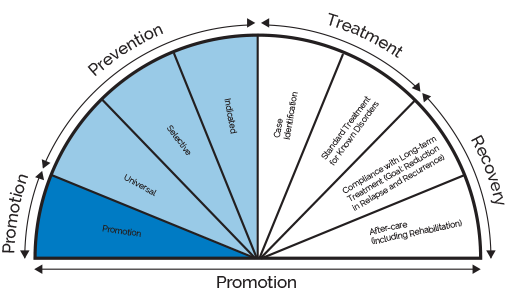
Working in the helping professions isn’t easy. Doing so during an addiction epidemic is harder still. If hope doesn’t prevail, we cannot continue.
Interventions for addiction fall along a continuum- from health promotion and prevention to treatment and finally, long-term support for recovery.
We’d like to share hope today, and we find it at every stop on the protractor, above.
Hope in Promotion
Public health campaigns have shaped our cultural norms over the years in a powerful way. Remember Click it or Ticket? Almost 90% of Americans claim to always wear a seat belt. After years of ad campaigns and warnings on cigarette packs, only 24% smoke tobacco. We know this wasn’t always the case, and successful health promotions get most of the credit. Our favorite right now is Talk. They Hear You. It not only encourages caregivers to communicate expectations to their kids, it models quick but meaningful conversations among adults.
wear a seat belt. After years of ad campaigns and warnings on cigarette packs, only 24% smoke tobacco. We know this wasn’t always the case, and successful health promotions get most of the credit. Our favorite right now is Talk. They Hear You. It not only encourages caregivers to communicate expectations to their kids, it models quick but meaningful conversations among adults.
Hope in Prevention
We know that prevention programs work when done properly- in fact, they save from $11 to $20 in societal costs for every dollar spent. But don’t take our word for it- here’s what 4th graders at Burrowes Elementary in Lancaster learned from our Leadership Day:
“I learned that you are a leader not only when you speak up, but when you listen to others (sic) ideas.”
“Don’t judge people by how they look.”
“Don’t follow bad ideas, be honest about how you feel about them.”
Hope in Treatment
This is the first time in many years that the Lancaster County Drug & Alcohol Commission has not run out of money, mid-fiscal-year, to pay for rehab for addicted individuals who don’t have insurance. And it’s due to grants from state and federal laws. In addition, Governor Wolf has declared addiction a statewide disaster emergency, allowing for, among other things, hospitals to treat addiction without applying for special licensing.
Hope in Recovery
People in long-term recovery have a unique ability, when trained and supported, to walk beside those in active addiction or early recovery. Pennsylvania offers a Certified Recovery Specialist (CRS) designation to those who train and test for it, and we are beginning to see CRS’s working in the community. A CRS is on call to support those brought to emergency departments after being revived from opioid overdoses, and are beginning to appear in treatment centers and recovery houses. We’re hoping the trend continues, and that these professionals will someday be found in social service offices, HR departments and places of worship–ready to help.